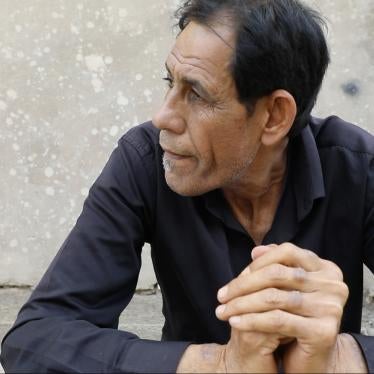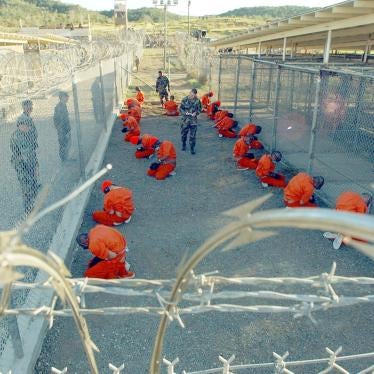The United States may have succeeded in carving out a piece of the world devoid of courts - and the fundamental rights they protect. A federal appeals court ruled this month that U.S. courts have no jurisdiction over the claims of detainees held on the U.S. military base at Guantanamo Bay, Cuba because the base is on sovereign Cuban soil.
The decision confused legal fiction with reality. The mistake may prove costly not only to the Guantanamo detainees themselves, but to the rule of law worldwide.
It is true that Guantanamo is land leased from Cuba. But a wiser court ruling would have acknowledged that Guantanamo is territory wholly under U.S. control; for all practical purposes, Cuban sovereignty is non-existent. Certainly U.S. officials would never acknowledge the jurisdiction of Cuban courts to hear claims brought by Guantanamo detainees. If the appellate decision is left standing, no court will be able to scrutinize how the U.S. treats its Guantanamo detainees.
The world will nonetheless continue watching what the United States does with its prisoners. Under international law, U.S. officials are obliged to respect the rights of persons under their effective control wherever they are. International human rights treaties the United States has ratified do not permit it to violate rights simply because the violations occur in another country. The obligation to refrain from arbitrarily detaining people, for example, does not stop at national borders. Conditioning human rights on accidents of geography would render them meaningless.
Nevertheless, the United States seems to believe the detainees at Guantanamo do not have any rights. It claims the unfettered discretion to hold without charges any non-citizen it labels as an enemy combatant for as long as it chooses. Unless the Supreme Court reverses yesterday's unfortunate decision, no court will tell it otherwise.
Yet international law, including the Geneva conventions and international human rights treaties, provide clear benchmarks for determining whether and for how long the United States can hold the Guantanamo detainees. Any disinterested review of those laws suggests at least three categories of detainees at Guantanamo are now being held unlawfully.
The first group are Taliban soldiers. As long as the war between Afghanistan and the United States continued, the Geneva Conventions permitted the United States to hold as prisoners without charges members of the Taliban government's armed forces. With that war having ended last June with the assumption of power of the Hamid Karzai government, the laws of war no longer permit the continued detention of those soldiers unless they are being prosecuted for war crimes or other offenses. They should be released and repatriated.
The second group consists of civilians who unnamed U.S. intelligence officials cited in news reports claim were sent by mistake to Guantanamo. The laws of war permit the internment of civilians in a war only upon an individualized showing their detention is necessary for imperative reasons of security. If there are indeed civilians at Guantanamo who have no connection to the Taliban or Al Qaeda and who are not being prosecuted, they too must also be released.
Finally, at least some suspected Al Qaeda members may have been brought to Guantanamo who were apprehended far from the war in Afghanistan. Six, for example, were picked up in Bosnia-Herzegovina. The laws of war do not apply to persons who were not picked up on a battlefield and who have no direct connection to an armed conflict. International human rights laws do apply - and they do not permit indefinite detention without charges or access to counsel.
At risk at Guantanamo are not only the rights of individual detainees who are being detained unlawfully. If the United States is willing to toss aside the clear mandates of international law, it sends a green light to every other country to do the same.
President Bush has repeatedly said that the war against terrorism is a war of values, a struggle to protect human dignity, human rights and the rule of law. At Guantanamo, that war is being lost..







